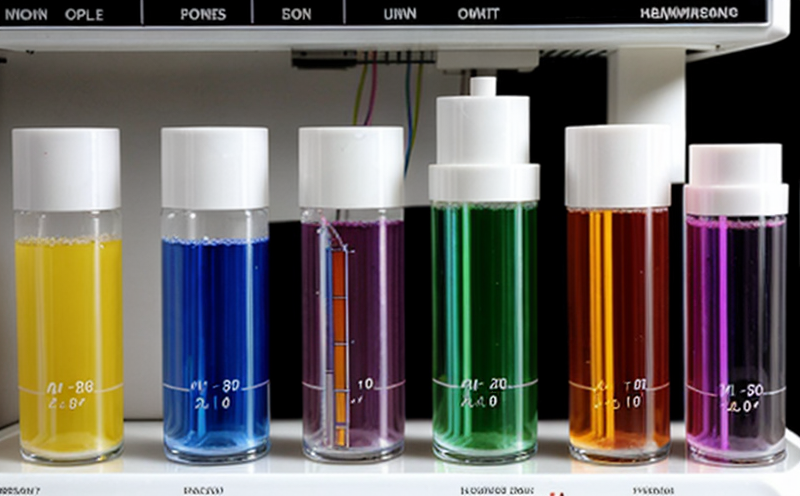USP 621 Chromatographic Separation Testing of Pharmaceuticals
The United States Pharmacopeia (USP) is a leading authority in setting standards for the identity, strength, quality, and purity of medicines. USP Chapter 621 outlines specific chromatographic methods used to assess the purity of pharmaceuticals through separation techniques. This service focuses on ensuring that the active ingredients in drugs are free from impurities and meet stringent quality criteria.
The process involves several critical steps, including sample preparation, injection into a high-performance liquid chromatograph (HPLC), and detection using various methods such as ultraviolet-visible spectroscopy or mass spectrometry. The method is designed to separate complex mixtures of components in the drug formulation, allowing for precise quantification and identification.
Our laboratory adheres strictly to USP 621 guidelines, providing accurate results that are crucial for regulatory compliance and product quality assurance. By offering this service, we support pharmaceutical companies in meeting global standards set by health authorities such as the FDA (US), EMA (EU), and TGA (Australia).
The importance of chromatographic separation cannot be overstated, especially when dealing with compounds that have closely related structures or varying degrees of solubility. This technique ensures that even trace amounts of impurities are detectable, which is vital for drug safety and efficacy.
Our team uses state-of-the-art equipment from reputable manufacturers like Agilent Technologies and Thermo Fisher Scientific to perform these analyses. The HPLC systems we employ feature advanced software solutions that allow for precise control over the separation process, ensuring consistent and reliable results every time.
In addition to technical expertise, our laboratory also ensures compliance with relevant international standards such as ISO 17025 and ICH Q7A. This guarantees that all testing procedures follow best practices and are validated thoroughly before being applied commercially.
| Equipment | Model | Manufacturer |
|---|---|---|
| High-Performance Liquid Chromatograph (HPLC) | 1260 Infinity II LC System | Agilent Technologies |
| Detection System | UV/Vis Detector and Mass Spectrometer | Thermo Fisher Scientific |
Why It Matters
The integrity of pharmaceutical products is paramount to public health. Ensuring that medications contain only the active ingredients they are intended to have, free from harmful contaminants or excipients not approved by regulatory bodies, is essential for patient safety.
USP 621 chromatographic separations provide a robust method for detecting these potential issues early in the manufacturing process. This helps pharmaceutical companies prevent costly recalls and safeguard their reputation while maintaining compliance with international regulations.
For quality managers, this service offers peace of mind knowing that every batch produced meets stringent purity standards. Compliance officers benefit from having reliable data to support regulatory submissions, ensuring smooth interactions with agencies like the FDA or EMA.
R&D engineers can rely on accurate chromatographic separations to optimize formulations and improve drug performance. Meanwhile, procurement teams can rest assured that raw materials used in production are free from adulteration, thereby supporting ethical sourcing practices.
Industry Applications
| Industry Sector | Application |
|---|---|
| Pharmaceuticals | Purity assessment of active pharmaceutical ingredients (APIs) |
| Biotechnology | Separation and analysis of recombinant proteins |
| Cosmetics | Detection of preservatives and other additives in formulations |
| Agricultural Chemicals | Identification and quantification of pesticide residues |
In the pharmaceutical industry, USP 621 chromatographic separations play a crucial role in ensuring drug safety. By identifying impurities that could potentially interact with the body differently than intended, these tests help prevent adverse reactions and improve overall patient outcomes.
The biotechnology sector benefits from this service through accurate protein separations necessary for therapeutic applications like monoclonal antibodies. In cosmetics manufacturing, purity checks are vital to avoid contamination that might compromise product efficacy or cause allergic responses.
Agricultural chemicals manufacturers also utilize USP 621 methods to ensure their products comply with strict residue limits set by regulatory bodies worldwide.
Environmental and Sustainability Contributions
Incorporating advanced chromatographic techniques into our testing protocols allows us to contribute positively towards environmental sustainability efforts within the pharmaceutical industry. By identifying and eliminating unnecessary or harmful additives during manufacturing processes, we reduce waste generation and promote cleaner production methods.
Our commitment to sustainable practices extends beyond just minimizing environmental impact; it also includes reducing resource consumption throughout the supply chain. Through precise chromatographic separations, we help manufacturers optimize resource usage by ensuring only necessary components are included in final products.





